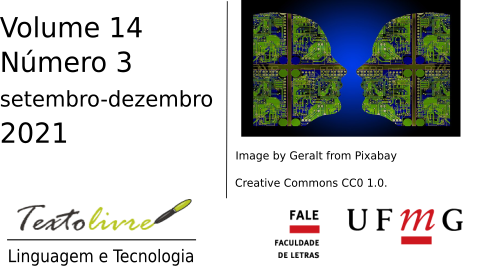Personalized and adaptive learning
educational practice and technological impact
DOI :
https://doi.org/10.35699/1983-3652.2021.33445Mots-clés :
Personalized learning, Adaptive learning, Learning barriers, Social responsibilityRésumé
Education Technology advances many aspects of learning. More and more learning is taking place online. Learners’ learning behaviors, style, and performance can be easily profiled through learning analytics which collects their online learning footage. It enables and encourages educational research, learning software application development, and online education practices towards personalized and adaptive learning. As we continue to see personalized and adaptive learning progress, we must also pay attention to the negative impacts that feed into our research. In this paper, we present our introspection of personalized and adaptive learning and argue that it is the social and moral responsibility of educators and institutions to apply personalized and adaptive learning wisely in their education practice. Educators and institutions should also recognize the realistic diversities of individual students’ learning styles and variable learning progress, contextually dependent learning accessibility, and their correspondent support needs for the fine-grained learning activities. We argue that strategically balanced practices and innovated learning technology are crucial towards an optimized learning experience for the learners.
Téléchargements
Références
AKO-NAI, F.; TAN, Q. Location-Based Learning Management System for Adaptive Mobile Learning. International Journal of Information and Education Technology, v. 3, n. 5, p. 529–535, 2013.
AKO-NAI, F.; TAN, Q., et al. The 5R Adaptive Learning Content Generation Platform for Mobile Learning. In: PROCEEDINGS of The IEEE International Conference on Technology for Education. Hyderabad, India: [s.n.], 2012.
BLOOM, B. S. Taxonomía de los objetivos de la educación. Clasificación de las metas educativas: Ámbito del conocimiento. Alcoy: Marfil, 1972.
CHANG, W.; TAN, Q. Augmented Reality System Design and Scenario Study for Location-based Adaptive Mobile Learning. In: PROCEEDINGS of the 13th IEEE International Conference on Computational Science and Engineering. Hong Kong, China: [s.n.], 2010.
DE MIGUEL, M. (Ed.). Metodologías de enseñanza y aprendizaje para el desarrollo de competencias. Madrid: Alianza Editorial, 2006.
DEWEY, J. Democracia y educación. Buenos Aires: Losada, 1971.
JOYCE, B.; WEIL, M. Modelos de enseñanza. Madrid: Anaya, 1986.
KRATHWOHL, D. R. Taxonomía de los objetivos de la educación. Clasificación de las metas educativas: Ámbito de la afectividad. Alcoy: Marfil, 1973.
LODGE, J. M.; CORRIN, L. What data and analytics can and do say about effective learning. npj Science of Learning, v. 2, n. 1, p. 5, Dec. 2017. DOI: 10.1038/s41539-017-0006-5. Available from: http://www.nature.com/articles/s41539-017-0006-5. Visited on: 2 Sept. 2021.
LODGE, M.; LEWIS, M. In Future Challenges, Sustainable Futures. In: PROCEEDINGS of ascilite Wellington. [S.l.]: Ascilite, 2012. Available from: http://www.learntechlib.org/j/ASCILITE/v/2012/n/1/. Visited on: 2 Sept. 2021.
LYNCH, T.; GHERGULECSCU, I. Large Scale Evaluation of Learning Flow. In: IEEE 17th International Conference on Advanced Learning Technologies. Timisoara, Romania: [s.n.], 2017.
PÉREZ, A. Paradigmas contemporáneos de investigación didáctica. In: GIMENO, J.; PÉREZ, A. (Eds.). La enseñanza: su teoría y su práctica. Madrid: Akal, 1983. p. 95–138.
PIAGET, J. Science of education and the psychology of the child. New York: Orion Press, 1970.
SCHÖN, Donald A. (Ed.). The Reflective turn: case studies in and on educational practice. New York: Teachers College Press, 1991.
SOLER, J. R. Estado actual y estrategias para futuribles de la formación a lo largo de la vida. In: PROCEEDINGS of VI Congreso Internacional de Formación para el Trabajo. Zaragoza: Editorial Tornapunta Ediciones, 2013. p. 369–379.
TAN, Q.; CHANG, W.; KINSHUK. Location-Based Augmented Reality for Mobile Learning: Algorithm, System, and Implementation. The Electronic Journal of e-Learning, v. 13, n. 2, p. 138–148, 2015.
TAN, Q.; KINSHUK, et al. A Collaborative Mobile Virtual Campus System Based on Location-Based Dynamic Grouping. In: PROCEEDINGS of the 10th IEEE International Conference on Advanced Learning Technologies. Sousse, Tunisia: [s.n.], 2010.
TAN, Q.; ZHANG, X.; PIVOT, F. C., et al. The 5R Adaptation Framework: Concepts, Systems, and Learning Scenarios. Journal of Internet Technology, v. 17, n. 5, p. 971–980, 2016.
TAN, Q.; ZHANG, X. K.; KINSHUK, et al. The 5R Adaptation Framework for Location-Based Mobile Learning Systems. In: ROCEEDINGS of the 10th World Conference on Mobile and Contextual Learning. Beijing, China: [s.n.], 2011.
U.S. DEPARTMENT OF EDUCATION. National Education Technology Plan. [S.l.: s.n.], 2017. Available from: https://tech.ed.gov/netp/. Visited on: 3 Sept. 2021.
WEIR, P. Adaptive Learning 3.0. Training Industry Magazine – Training in Another Dimension, p. 40–43, 2019.
Téléchargements
Publiée
Numéro
Rubrique
Licence
(c) Copyright Texto Livre: Linguagem e Tecnologia 2021

Ce travail est disponible sous la licence Creative Commons Attribution 4.0 International .
Il s'agit d'un article en libre accès qui permet une utilisation, une distribution et une reproduction sans restriction sur n'importe quel support tant que l'article original est correctement cité.











